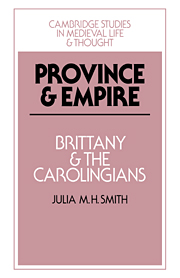Book contents
- Frontmatter
- Contents
- List of illustrations
- Acknowledgements
- List of abbreviations
- Note on nomenclature
- 1 Neustria, Brittany, and northern Aquitaine
- 2 Redon and environs
- Introduction
- 1 Settlement and society in dark age Brittany
- 2 Neustria and the Breton march
- 3 The Bretons in the Christian empire of Louis the Pious
- 4 Carolingian hegemony and Breton revolts, 840–874
- 5 An anatomy of power
- 6 Churches and learning in Carolingian Brittany
- 7 The end of Carolingian Brittany
- List of manuscripts cited
- Bibliography
- Index
- Cambridge studies in medieval life and thought Fourth series
6 - Churches and learning in Carolingian Brittany
Published online by Cambridge University Press: 26 October 2009
- Frontmatter
- Contents
- List of illustrations
- Acknowledgements
- List of abbreviations
- Note on nomenclature
- 1 Neustria, Brittany, and northern Aquitaine
- 2 Redon and environs
- Introduction
- 1 Settlement and society in dark age Brittany
- 2 Neustria and the Breton march
- 3 The Bretons in the Christian empire of Louis the Pious
- 4 Carolingian hegemony and Breton revolts, 840–874
- 5 An anatomy of power
- 6 Churches and learning in Carolingian Brittany
- 7 The end of Carolingian Brittany
- List of manuscripts cited
- Bibliography
- Index
- Cambridge studies in medieval life and thought Fourth series
Summary
In sending Hatto, archbishop of Mainz, his collection of canons, Regino of Prüm remarked: ‘Just as the various nations of peoples are distinguished from each other by race, customs, language and laws, so the holy universal church throughout the world although joined together in unity of faith nevertheless differs from place to place in ecclesiastical customs. Some customs in ecclesiastical practices are found in the kingdoms of the Gauls and of Germany, others are found in the eastern kingdoms and in overseas places.’ In ecclesiastical and cultural life as in political society, the bedrock of the Carolingian empire was regional identity and local custom. Historians have tended to be mesmerised by the brilliance of Carolingian court culture and by its rhetoric of unity, but wherever scholars have searched with an eye for nuanced difference, they have found evidence that substantiates Regino's comments. The early medieval church was a medley of characteristically regional habits, in bible texts, canon law, and liturgy as in manuscript illumination and script or saints' cults. However, just as at the apogee of Carolingian power the royal court exercised a strong centripetal pull against the grain of local political life, so too the religious and cultural life of Carolingian provinces was profoundly affected by central influences, demands, and expectations.
These influences were of two very different types.
- Type
- Chapter
- Information
- Province and EmpireBrittany and the Carolingians, pp. 147 - 186Publisher: Cambridge University PressPrint publication year: 1992



